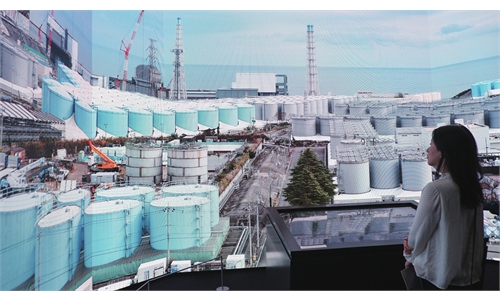IN-DEPTH / IN-DEPTH
GT investigates: Fish have no voice, so we fishermen have to speak out for the ocean, Fukushima fishermen say
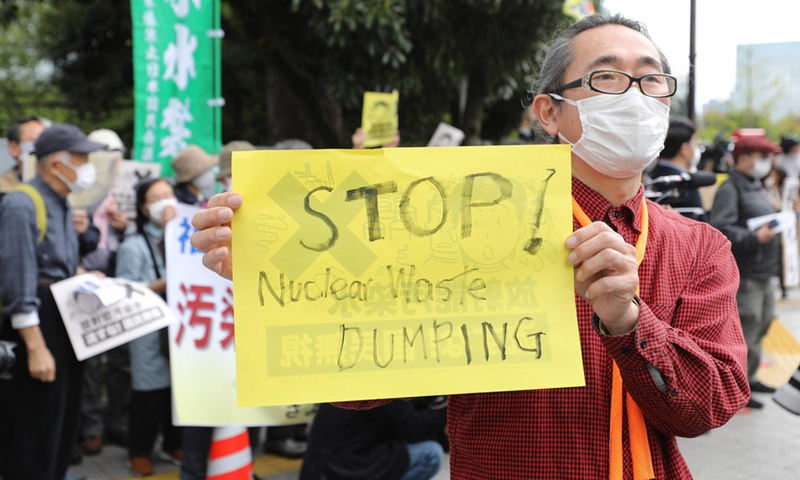
People rally to protest against the Japanese government's decision to discharge contaminated radioactive wastewater in Fukushima Prefecture into the sea, in Tokyo, capital of Japan, April 13, 2021. Photo: Xinhua
Editor's note:
Located at the confluence of cold and warm currents, the coastal area of Fukushima Prefecture, Japan, has a rich variety of sea life and a long history of local fishing.
In the 12 years since the accident at the Fukushima Daiichi Nuclear Power Plant, the fishing industry in the area has started to recover thanks to the efforts of local fishermen and other groups.
However, the Japanese government and the Tokyo Electric Power Company (TEPCO) have gone back on their promises and arbitrarily decided to dump nuclear-contaminated wastewater into the sea, in a big blow to the Fukushima fishing industry and the prefecture's revitalization.
As the scheduled plan to dump the nuclear-contaminated wastewater from Daiichi plant approaches, Global Times reporters went to Fukushima. In this second installment of this field investigation, the Global Times reveals the helpless fishermen who are speaking out.
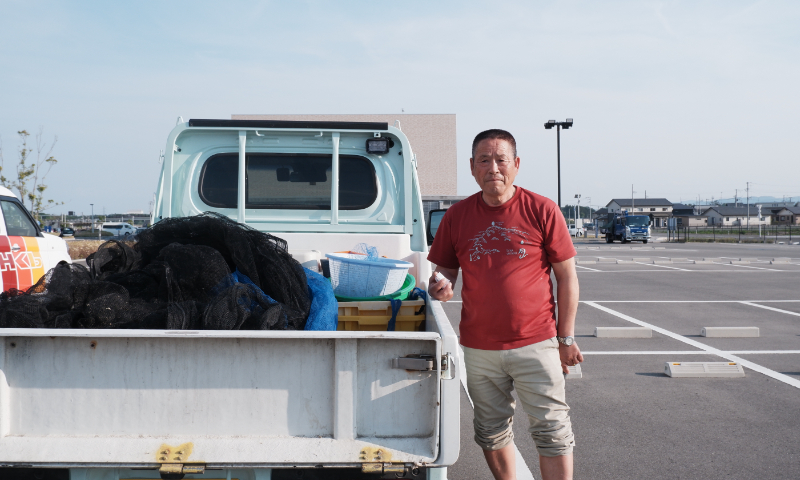
Haruo Ono, Fukushima fisherman Photo: Xu Keyue/GT
Silenced Fukushima fishermen
Fishermen in Fukushima were banned from fishing after the March 11 earthquake and tsunami in 2011, which caused leaks at the Fukushima Daiichi Nuclear Power Plant. In 2015, the Japanese government, TEPCO, the Fukushima Prefectural Federation of Fisheries Cooperative Associations, and the National Federation of Fisheries Cooperative Associations of Japan signed an agreement, stating nothing would be done "about the nuclear-contaminated water from Fukushima without the understanding and consent of the relevant people." However, in April 2021, the Japanese government blatantly broke its promise and announced that it had decided to dump the nuclear-contaminated wastewater from the Daiichi plant into the sea in two years, which has sparked strong dissatisfaction from fishery associations and the wider public.
As the most direct stakeholders, the voices of Fukushima fishermen are indispensable in the opposition to the disposal of nuclear-contaminated wastewater. However, when contacting them before the trip to Fukushima, Global Times reporters were surprised to find that the local fishermen were not allowed to speak.
Global Times reporters contacted industry groups such as the Fukushima Prefectural Federation of Fisheries Cooperative Associations and Fukushima Prefecture's Soma Futaba Fisheries Cooperative Associations for help in reaching fishermen in their areas, but were told that "individual fishermen are not allowed to give interviews." Toshimitsu Konno, president of the Soma Futaba Fisheries Cooperative Associations, told the Global Times that fishermen have different views and need to unify their opinions to form a single position on behalf of the association before negotiating with the Japanese government and TEPCO.
The voices of fishermen are at the heart of a series of field investigations into the issue of nuclear-contaminated wastewater at Fukushima. Global Times reporters tried other ways to contact the fishermen for interviews, but were either rejected or ignored.
It is understood that Japan's trade associations are highly hierarchical and an extremely closed society. If members are excluded for offending the trade associations, it is equivalent to losing their jobs. When asked for an interview, one fisherman said, "we have to fish here for generations."
However, Haruo Ono, a fisherman from the town of Shinchi in Fukushima, said he was willing to be interviewed. He had something to say about the dumping of nuclear-contaminated wastewater.
The town is the northernmost part of Fukushima's coastline, where rivers run eastward into the Pacific Ocean. Since Iwaki city where the Global Times reporters stayed is in the southernmost part of Fukushima Prefecture, to interview Ono, they set out early and drove north through towns of Hirono, Tomioka, Futaba and Namie, near the Daiichi and Daini nuclear power plants, and through Minamisoma and Soma cities, for more than 100 kilometers before arriving at Shinchi.
The town's largest station, Shinchi station, was washed away by the tsunami in 2011. The new station reopened in December 2016, about 700 meters from the coast, and is famous for its views of the sea. The town is expected to boost its revitalization after the disasters.
Generations of the Ono family have lived by fishing. Ono, who was fishing at the time, narrowly escaped the March 11 earthquake and tsunami, but his younger brother Tsunekichi died in another fishing boat. It was four months before Tsunekichi's body was found.
After the accident, fishermen were unable to fish normally for a long time and have not fully recovered until now. For years, Ono has been pressing for answers from the Japanese government and TEPCO.
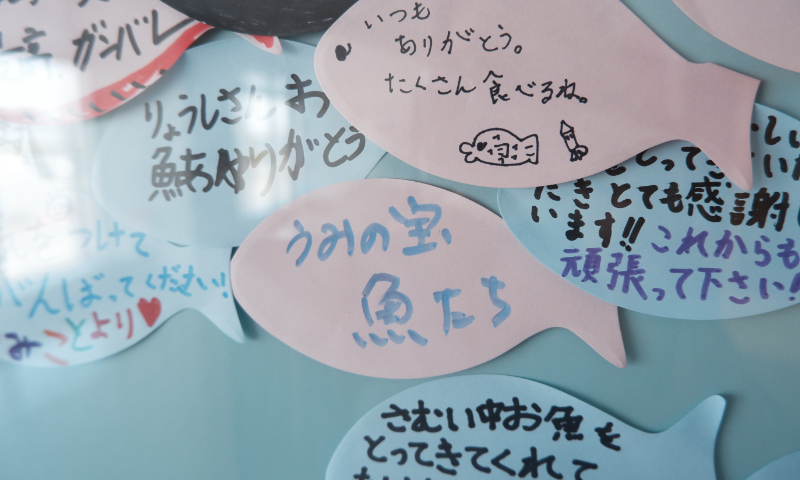
A sticker that reads "treasure of the sea - fish" is seen on the wall in the building of the Fukushima Prefectural Federation of Fisheries Cooperative Associations. Photo: Xu Keyue/GT
"When can Kishida come and listen to us?"
About two weeks ago before the trip, the Global Times reporters and Ono made an appointment for the interview. Approaching the agreed time, the reporters wanted to remind Ono, but were unable to contact him. On the day of the appointed interview at a hotel lobby near the Shinchi station, the reporters arrived in advance and waited for him, feeling worried that One might miss the appointment if he was under pressure from the fishery association.
At this moment, the automatic door of the hotel opened and Ono came striding in with the sun shining on his back.
Dressed in slippers and red shorts and smelling slightly fishy, the 71-year-old walked briskly, holding forth without waiting for a reporter's question.
"When will Fumio Kishida, the Japanese prime minister, come and listen to our voices? When can he come to know the real situation in Fukushima?" asked Ono, speaking quickly in the Fukushima dialect.
"Does the government think that by issuing leaflets telling people that the nuclear-contaminated wastewater is OK, it can be released into the sea? Is that really safe? The sea is not a dustbin! In Japan, where people are fined for throwing rubbish into the sea, how can the wastewater containing radioactive materials be discharged into the sea? It is really strange that the Japanese government and TEPCO chose the easiest and cheapest way to throw out the wastewater when there were other options," Ono said with a puzzled face.
Ono started fishing with his father when he was 15 years old, and for the past 56 years he has lived by the sea and on the sea.
Although the Japanese government and TEPCO gave fishermen some compensation after the disaster, they often doubt the value of their lives as they have been mercilessly deprived of a place to work.
Fukushima fishermen are now allowed to go out to sea 10 times a month, and the day of the interview was Ono's second fishing day in May. On the day, he went fishing at 2 am, returned home at 5 am and began collecting fish, repairing nets, and cleaning boats. After taking a break, he went to the market at 1 pm, sold the fish to a wholesaler and finished his work at 3 pm.
"It [Fukushima] used to be a treasure house for fresh and delicious seafood! The sea is a gift of nature, not the private property of human beings. For fishermen living in such island countries, the sea is our god!" Ono said.
"But if the nuclear-contaminated wastewater is dumped into the sea at a time when the fishing situation in Fukushima has just improved, the efforts of the past 12 years will be wasted," Ono said angrily. "This is devastating for the Fukushima fishing industry."
What made Ono speak out when the fishery associations banned individual fishermen from giving interviews? In response to the question, Ono said, "I didn't do anything wrong, neither did other fishermen! Fish can't talk and neither can the sea, so fishermen have to speak for them."
Ono believes that it is difficult to realize the project of decommissioning TEPCO's Fukushima Daiichi Nuclear Power Station Units 1-4 in the next 30 or 40 years. How to properly retrieve fuel debris from the units is the key. There is no need to rush to "drain the nuclear-contaminated wastewater" when key issues have not been effectively resolved.
The Japanese government and TEPCO claim that the ALPS-treated water is "safe." But if the problem and actual harm of the released radioactive wastewater is discovered 30 or 50 years later, by then, not only the prime minister, but other top government officials and TEPCO heads will have changed, so they won't have to take responsibility for the decision.
"My three sons are fishermen," Ono told the Global Times. "For the sake of future generations, I must now stand up against the wastewater discharge. I hope that the plan can be postponed or canceled. It is necessary for all parties to calmly discuss how to deal with the Fukushima nuclear-contaminated wastewater."
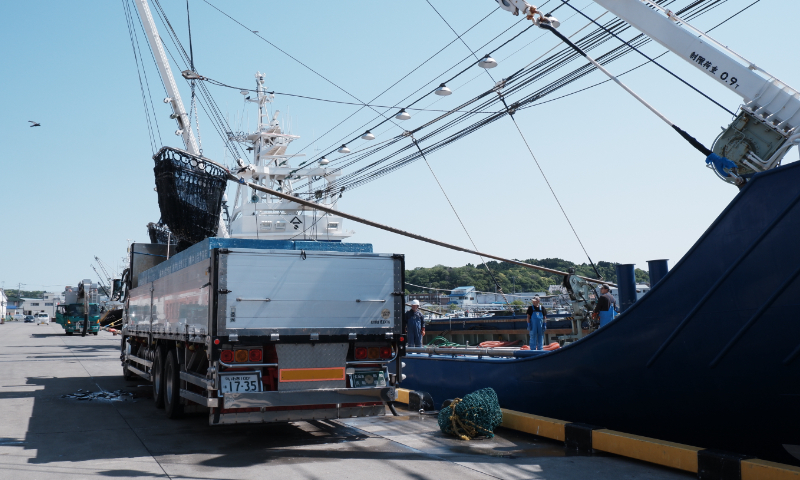
In Onahama fishing port, Fukushima Prefecture, the fishermen load their catch onto a waiting truck on May 11, 2023.
Subdued fish market
After visiting the Fukushima fish market and fresh food stores, Global Times reporters understood Ono's concern. The port of Onahama, about 15 kilometers from downtown Iwaki, is the largest port in Fukushima Prefecture, where returning fishing boats unload their cargo and go straight to the nearby Onahama fish market.
The fish market usually opens early in the morning, but when Global Times reporters arrived at 8:30 am, the market was empty. A staff member told the reporter that the seafood was not sold until 11 am, and only to designated wholesalers.
So will consumers still be able to eat fresh fish? Tadaaki Sawada, chief of the guidance section of Fukushima Prefectural Federation of Fisheries Cooperative Associations, explained that the markets stagger the trading hours because wholesalers have to go to different markets. Also, it takes a while for the fish to have radioactivity detection before they go on sale.
Konno, president of the Soma Futaba Fisheries Cooperative Associations, gave a more detailed explanation. He said that after the disaster, in order to ensure the safety of aquatic products in Fukushima, only fish species deemed safe after testing could be caught. They also sample each species of fish on each sale day. The standard is 50 becquerel per kilogram (㏃/kg), half the national standard of 100 ㏃/kg according to Japan's food health law. If the radioactive level of seafood is tested higher than 25㏃/kg, more detailed checks will happen to make sure that the seafood does not circulate in the market.
When the clock struck 11 am, trading began at the Onahama fish market. Unlike the bustling scenes seen on television, there are only a few rows of the catch in the market, and no more than a dozen fishermen and wholesalers.
Global Times reporters also visited seafood shelves in local supermarkets and found many imported products from areas such as the US, Chile and Russia, but those from Fukushima were nowhere to be found.
Fukushima resident Akira Sakuma told the Global Times that eating seafood "is all about freshness. I can't wait to eat sashimi right after I catch it. When I think the seafood has to be tested first I always feel strange."
Sawada said that seafood sales in Fukushima only recovered about 20 percent in 2022 compared with 2010 before the disaster, and the distribution channels have not expanded.
"We never thought of releasing Fukushima nuclear-contaminated water into the sea," Sawada said.
Sawada said that "rumor damage" caused by the Daiichi plant accident still exists and it is sad that the wastewater dumping plan has aggravated such damage. We "deeply regret" about the Japanese government's decision to dump the nuclear-contaminated wastewater, Sawada said.
"There is no change in the Fukushima fisheries association's clear stance against the discharge plan," Sawada said, stressing that he will continue to express his opposition to the plan to the Japanese government and TEPCO in collaboration with the national fishery associations and other organizations.
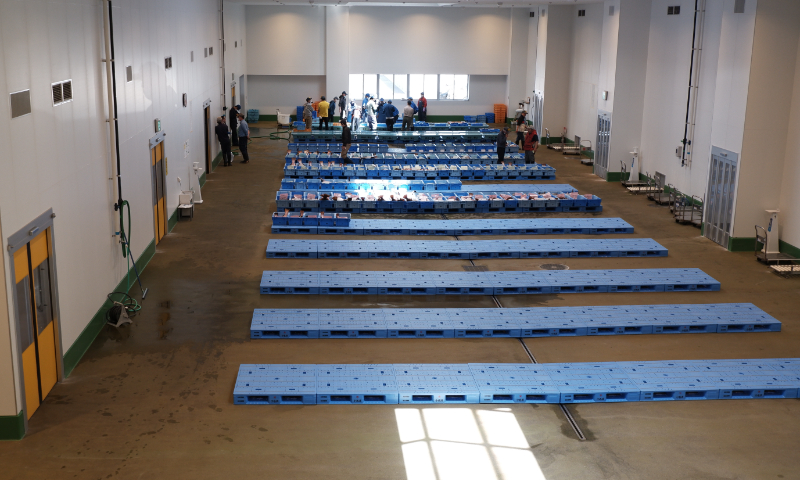
Seafood trading begins at 11 am on May 11, 2023 at the Onahama fish market. Photo: Xu Keyue/GT
World's responsibility to protect the sea
Why would the associations prohibit individual fishermen from speaking out when they also opposes the dumping plan? What is the "unified position" of the association, and how did the negotiations with the Japanese government go?
Konno said that the Japanese government and TEPCO have seemingly broken their promise with fishery associations and insisted on the dumping plan. However, he added, the Japanese government is actively holding events such as seminars to gain the understanding and consent of fishery workers. Konno's comments appeared to leave some room between fishermen and the government.
According to public data, TEPCO has spent more than 12 trillion yen ($8.67 billion) on compensation for victims and the Daiichi decommissioning project since the Fukushima Daiichi accident, including compensation for fishermen. But the Global Times learnt that the fishermen have not received a penny in compensation for the government's decision to dump the nuclear-contaminated wastewater into the sea.
The Japanese government has set up an 80 billion yen fund to deal with the potential effects of the dumping plan on the fishing industry, of which 50 billion yen is to be used to subsidize soaring fuel costs and another 30 billion yen to freeze and store seafood.
According to the "assumption" of the Japanese government, if the Fukushima nuclear-contaminated wastewater discharged into the sea affects the sales of Fukushima seafood, the goods can be frozen and stored first, and then unfrozen and sold after the sales price recovers. This operation method makes fishermen laugh and cry. Ono repeatedly mocked the senior government officials.
A source told the Global Times that the "unified opinion" claimed by the fishery associations perhaps related to their negotiations with the Japanese government and TEPCO and discussions about compensation.
In fact, for fishermen, the sea is not only their livelihood, but also their life! During the interview with Ono, he stressed that opposing the dumping plan is not a matter of money, and that it is the mission of fishermen to protect the sea. He remembers despairingly sending seafood to Tokyo's Tsukiji seafood market years ago and receiving a refusal, which said there was "no need" for Fukushima's fish.
Ono said that China, South Korea and other countries are very concerned about the wastewater dumping plan, and German reporters have also come to interview him. "It is the common responsibility of the world to protect the sea by opposing the release of nuclear-contaminated wastewater. But it is a pity that the Japanese media does not seem to care about this," Ono noted.
After the interview with Ono, which ran well past the scheduled time, the sun hung over the land.
Pointing to the nearby Karozan mountain, Ono told the Global Times reporters, "See? I climb that mountain every day! I want to live to be 100 years old in good health. I want to see with my own eyes whether the problem of nuclear-contaminated wastewater in Fukushima can be solved and whether the local fishing industry can be revived."

